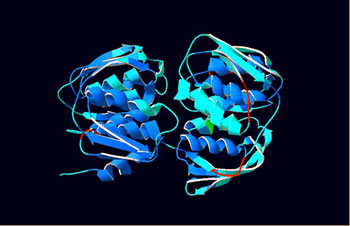| 2003 |

|
YEAR BOOK |
Institute of Technology Carlow
|
Chinese-Irish collaborative project in biotechnology at IT Carlow
|

The laboratories in the Institute of Technology Carlow and the Department of Life Sciences, Peking University, have retrieved genes of interest from microorganisms isolated from extreme polluted environments such as glyphosate (a herbicide which is an active ingredient in some commercial products), heavy metal resistance and genes for degradation of chlorinated aromatics. These genes and their proteins may have useful biotechnological properties - especially if further modified or used to construct transgenic plants.
In a recent joint research project carried out in Carlow by Yicheng Sun from Peking University, a 3D model of a novel EPSPS (glyphosate tolerance enzyme) has been generated and the original microorganism further characterised. In addition, a genomic library of another microorganism isolated from a Chinese glyphosate manufacturing site has been constructed. Subsequent work by Robert Ryan has identified a novel solvent/metal tolerance system from this library. These examples illustrate the potential for prospecting or 'mining' microbial diversity to yield genes with useful industrial/environmental and agricultural applications.
The ongoing collaboration between Institute of Technology Carlow and Peking University will be further developed to promote joint research activities in the area of bioinformatics, microarrays and protein engineering, which will be used to isolate, characterise and evolve genes and oligonucleotides of interest to industry, environment and agriculture.
Contact: Dr David Dowling; Tel: 059 91 70487; E-mail: [email protected]